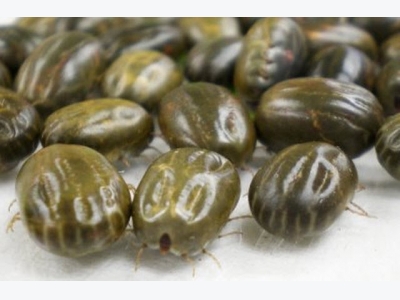New vaccine may control cattle ticks

A new vaccine developed by Agricultural Research Service (ARS) scientists with the U.S. Department of Agriculture (USDA) can help prevent a reinfestation of cattle fever ticks in the United States.
The economic impact of cattle fever ticks, including the southern cattle fever tick, Rhipicephalus (Boophilus) microplus, was so severe in the late 1800s that the U.S. Department of Agriculture started an eradication program in the early 1900s to eliminate the deadly disease bovine babesiosis, which is transmitted by this parasitic pest.
Although cattle fever ticks were declared eradicated in the United States in 1943, today they are still common in Mexico and can hitchhike on stray livestock, white-tailed deer, and other wildlife that cross the Rio Grande River into Texas.
New vaccine developed
Insect physiologist Felix D. Guerrero and his colleagues made a significant discovery while sequencing the complicated, huge cattle tick genome, which contains about 2.5 times the DNA of the human genome. Guerrero and his fellow scientists developed a recombinant tick aquaporin protein vaccine and partnered with the Brazilian Agricultural Research Corporation (Embrapa) to test the vaccine's ability to protect cattle against infestation.
Holstein trial shows good results
Molecular biologist Renato Andreotti and his team at the Embrapa National Center for Beef Cattle Research in Campo Grande, Brazil, put animals infested with a known amount of cattle tick larvae into two pens. One group was vaccinated with the aquaporin vaccine and the other group was not vaccinated. Researchers compared the number of adult ticks produced on each vaccinated and unvaccinated cow. "In two trials, we saw a 75-percent and 68-percent reduction in the number of ticks on vaccinated 1-year-old Holstein calves," Guerrero says. "This demonstrated that the aquaporin protein shows promise as an antigen in cattle vaccines to help prevent cattle fever tick infestations."
Patent received on new vaccine
"Our research goal is to provide tools for U.S. ranchers to help control cattle fever ticks and prevent reinfestation of the United States," Guerrero says. "This new vaccine is one more step toward meeting that goal." ARS has received a patent on the aquaporin protein vaccine and on another tick vaccine tested at the same time in Brazil. The agency is working with an animal health company, looking at the feasibility of producing a commercial aquaporin vaccine.
Related news
 Identify and fix your mycotoxin contaminated silage
Identify and fix your mycotoxin contaminated silage Given the uneven distribution of fungi and the mycotoxins they produce in a single lot, proper sampling is key to correctly assessing the specific on-farm
 Mastitis prevention with mammary probiotics
Mastitis prevention with mammary probiotics New research shows that the cow’s own lactic acid bacteria, isolated from the bacteria in the mammary gland, could serve as a tool to prevent and treat mastitis
 Large cow herd and animal health collide
Large cow herd and animal health collide In terms of animal health, to manage a company with 400 cows demands much more effort than a sole proprietorship. Some of the growing farms have a grip on this